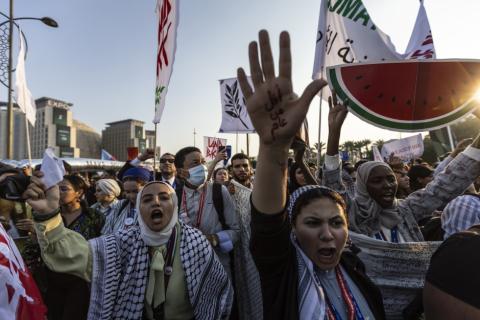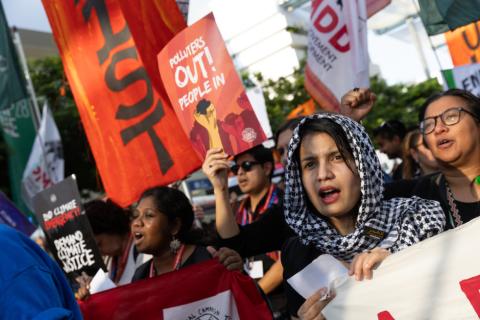
Why Palestine's Ongoing Genocide is a Feminist Issue
Photo: Cease Fire Protest at COP28
By: Maryam Al Tibi is the external relations and communications officer at The Democracy and Workers Rights Center in Palestine; and Alejandra Scampini, is a Program Coordinator at the International Network of Economic Social and Cultural Rights (ESCR-Net)
In the quest for gender equality, every setback is a blow to progress, resonating far beyond its immediate impact. Nowhere is this more evident than in the ongoing genocide in Palestine. As feminists, we recognize that the principles of social justice and human rights know no borders, and it is incumbent upon us to stand in solidarity with the Palestinian women and girls, whose. lives and futures are at heightened risk as part of a prolonged Israeli occupation of their land.
The urgency of addressing the gendered impact of Israel’s genocidal campaign cannot be overstated. Since 7 October 2023, more than 30,000 Palestinians have been killed in Gaza, the majority of whom are women and children. Over 370 Palestinians have also been killed in the West Bank. The grim reality is stark: the UN estimates that one million women and girls are displaced, while two mothers lose their lives every hour. Furthermore, UN experts have expressed alarm over allegations of human rights violations against Palestinian women and girls in Gaza and the occupied West Bank since Israel launched its war. The experts said they were “appalled” by reports of the deliberate targeting and extrajudicial killing of Palestinian women and children in places where they sought refuge or while fleeing.
We also cannot ignore that, like elsewhere in the world, women in conflict and occupied lands are the most affected by violence, displacement, loss of employment, and limited access to essential services such as education and healthcare. For over 75 years, Palestinian women across their occupied land, have been substantially deprived of their rights due to Israel’s prolonged occupation and oppression against Palestinian people. According to a 2022 report, the Gaza blockade has taken a heavy toll on women and girls by undermining living conditions, restricting access to essential services, increasing their care burden, and heightening vulnerability to all forms of gender-based violence. Furthermore, the presence of Israeli forces in the West Bank and Occupied East Jerusalem exacerbates the prevalence of sexual violence.
As thousands of women and gender-diverse individuals from all corners of the world gather in New York for the 68th session of the Commission on the Status of Women, it is imperative that we elevate the voices of Palestinian women in all their diversities and demand accountability for the atrocities committed against them. We must call for an immediate ceasefire and address the causes of Israeli aggression, rooted in decades of military occupation, settler colonialism, and apartheid imposed by Israel.
Activists standing in solidarity with Palestinian peoples during COP28
Furthermore, as the Commission focuses this year on strengthening institutions and financing with a gender perspective to address poverty and empower women and girls, it is essential to confront the hypocrisy of wealthy nations, such as the United States, Germany and Australia, that withhold funding from vital agencies like UNRWA. This UN agency not only provides lifesaving services in war-torn Gaza but also delivers vital healthcare, education, and other services to around 5.6 million Palestinian refugees. By suspending funding under dubious accusations amidst an unfolding genocide, these nations may be complicit in the catastrophic consequences on Palestinian refugees, particularly women and girls.
How can we expect states to advance and implement policies aimed at gender equality, women’s empowerment, achieving sustainable development, and promoting peaceful, just, and inclusive societies when there is a blatant double standard in the application of international law? Despite the International Court of Justice (ICJ) recognizing on 26 January 2024 the plausibility of Israel committing genocide against Palestinians in Gaza and issuing a series of emergency provisional measures demanding an end to its genocidal campaign, Israel has persisted in its atrocities. These actions are the result of a system of oppression and repression that has been built with the complicity of the U.S. government, which has systematically fueled Israel with billions in military aid, totaling approximately $3.3 billion a year.
True gender equality cannot thrive in a world plagued by violence and injustice, where militarism and patriarchal systems intertwine to perpetuate oppression. As feminists, it's crucial for us to acknowledge the interconnectedness of all struggles for justice and stand together in solidarity. While we advocate for a permanent ceasefire, we must also tirelessly amplify the voices of all Palestinian women, ensuring their rights are recognized and respected, including their fundamental right to self-determination and an end to the occupation of Palestine.

